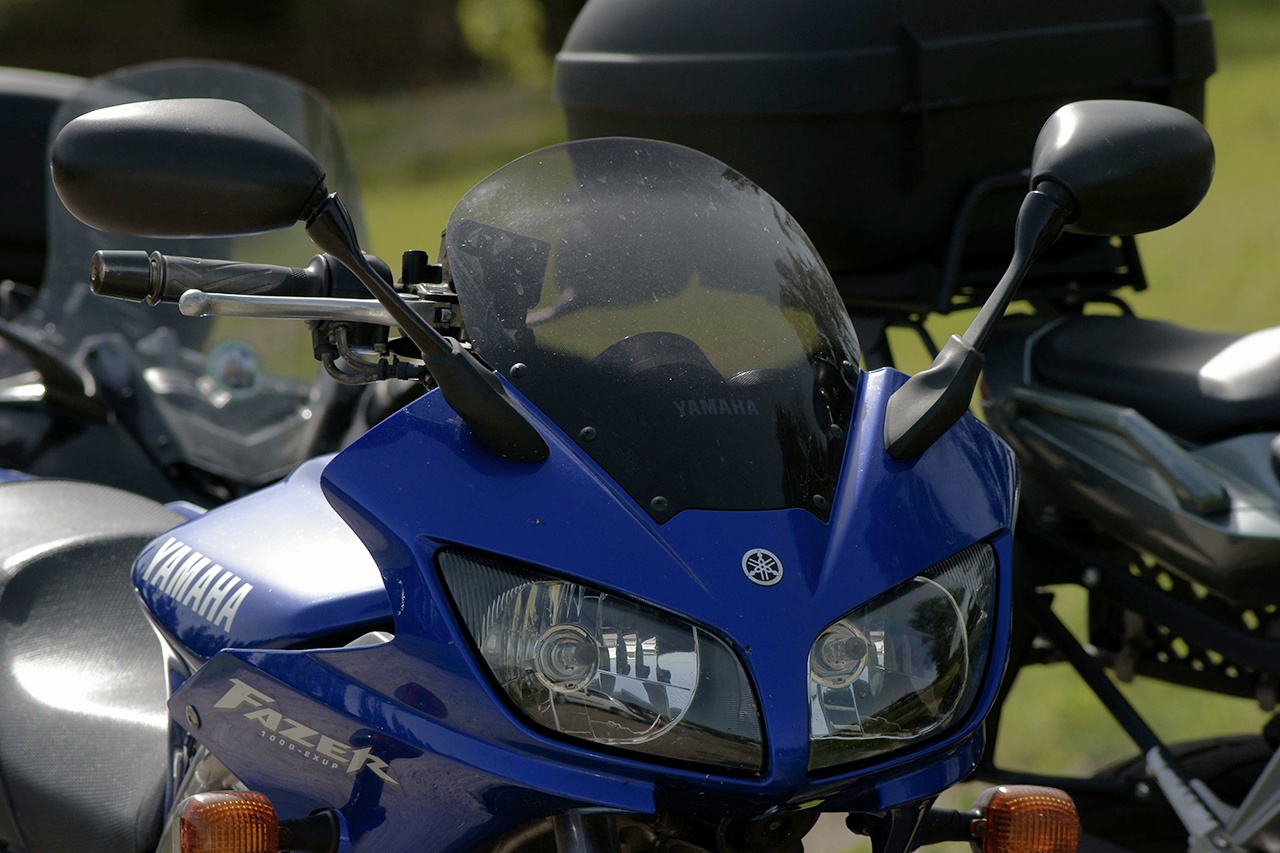For kicks, check out our FTC disclosure here. Updated Nov 22, 2024 ...
Motorcycle Sharing: Rent A Bike Near You
My husband Robin is excited about his new flagship motorcycle, a BMW R1200RS for 2018's riding season. He's also pre-mourning the eventual goodbye to a longtime love, his Suzuki Bandit 1200. Celebrating the Beemer feels like a betrayal to the (ready to rent) Bandit, who has taken him 55,000 miles through twenty-three states over five years.
She's been maintained, upgraded, repaired, updated, enhanced ... in a word: loved.
Robin doesn't want to sell her but as many riders understand, multiple bikes results in more maintenance and less time. Whether the motorcycle runs or is a project, you can only ride one at a time and no matter how much you treasure each bike, you tend to ride one more than most.
With a heavy heart, Robin wrote an ad listing the Bandit for sale.
One week later, a different kind of ad, a crafty and opportunistic little ad (thanks to a spying son-of-an-algorithm) gave him an idea.
Why not rent the Bandit out to others? Make a buck while she's waiting for a new owner. Put her right next to the Driftless in Wisconsin. Yeah, maybe she'll even be worth more to keep and rent out than sell her, right Sweetie?
Rent The Motorcycle ... Say what? (Me, With A Raised Eyebrow)
The sharing economy has come to motorcycling. Twistedroad.com (TR) and Riders-Share.com (RS) have both been called "Uber for motorcycles".
Uber has the owners of cars driving passengers around like a taxi used to in the old days. With TR and RS, you're not being taxied around on the back of a motorcycle. I'd compare TR and RS more to Getaround or Turo where car owners let others rent their cars.
All peer-to-peer sharing services operate under the concept of connecting owners with under-utilized assets to responsible renters. Each service's platform connects both sides for a fee.
Motorcycle rental already exists but not in the sharing economy. TR and RS are the first to test "sharing" in our special market.
TR started from the founder's being near great roads without a motorcycle too many times. The RS "epiphany" came when its founder was in between bikes and noticed his neighbor's unridden bike.
The idea of renting someone else's motorcycle sounds great. The idea of renting out your motorcycle to someone else sounds less great.
How do you comfortably let someone you've never met ride your motorcycle? We'll get into that.
How It Works For Owners
If you choose to list a bike, both services state the motorcycle should be properly maintained and in good running condition. Think: this is a motorcycle you'd put your mother on. The motorcycle needs to be registered within the US, have a clean title and meet state insurance requirements.
“Riding a for-rent motorcycle means less vacation time spent in transit to great motorcycling roads. Renting your motorbike to others means you earn money.”
RS accepts all types of two-wheelers, including scooters. They state they "strongly prefer cruiser motorcycles because they're statistically safer." As this site focuses on sport touring riders, talk amongst yourselves on that one.
TR doesn't allow scooters, dirt bikes or trikes. They also recommend model-year 2000 or newer and less than 50,000 miles logged. They do accept "vintage" bikes older than 1990 with market value up to $10,000. Refer to their site for the full specs here.
Both Use The Same Basic Process
- List motorcycle and choose the rate you want to charge
- Review rental request then accept or decline
- Coordinate to meet the renter with your bike
- Renter returns the bike
- You get paid
Each site does a good job of answering common questions for both owners and renters ...
- What are the renter's requirements?
- Who verifies or checks the driver's license information?
- What are the rider's experience requirements?
- How does gas and insurance work?
- What happens if there's an accident?
Benefits As An Owner
The obvious and compelling reason to consider renting your motorcycle is to earn money. Whether the income goes towards justifying the overall use rate of your bike(s), pays off the motorcycle or gets you closer to buying more bikes, the money you receive is a treat ... like candy ... or beer.
Those of us not living in California or Florida usually ride during the "warm" months, otherwise called the riding season. Some commute to work daily but many of us ride when not working. This results in days or months of unused motorcycle time. If you own more than one bike, multiply that.
Motorcycles want to be ridden. If you have more than one, you can't ride all of them all the time. Because you're a benevolent owner, this is a way to help the others in the flock get ridden.
This is also a way to give back. This helps other riders in the community explore great roads near you and shows them off. You get to network and meet other riders you might not otherwise.
Assuming each site's precautions are followed, liability is placed on the renter, not you. Whew!
How It Works For Renters
The basic process is the same for renters:
- Search for a motorcycle
- Request rental
- Coordinate to meet the owner to pick up the bike
- Enjoy the ride safely
- Return the bike
The owner may provide or even rent riding gear but as the rider, don't count on it. You should be prepared to have your own and comply with the state's helmet law requirement. This can mean bringing an extra suitcase or bag of ATGATT. Golfers, skiers and snowboarders do it all the time. It's not that serious if you're serious about your experience and safety.
You must provide details such as your driver's license, riding history and insurance information for TR. Be prepared to have your stats run: MVR and background check as well as your identity verified.
Riders can ride solo or with a passenger. Riders can't rent bikes for other riders or let anyone else control the motorcycle during the rental.
You can rent a motorcycle for a day or multiple days.
As the renter, if something goes wonky, either yours or RS's motorcycle insurance takes care of it.
Owner/Renter Handshake (Pre-Ride Check)
The owner's responsibility is to provide a motorcycle that's in good mechanical working condition. You as the renter will do a motorcycle check with the owner at the time you meet for motorcycle pick-up. If anything seems awry, don't go through with the rental. Otherwise, once you accept and ride off, the responsibility baton stays with you.
That sounds more ominous than it is in reality. If you were renting a car or motorcycle from a traditional service, you'd bear this responsibility.
TR requires you to have your own motorcycle insurance. The pre-requisite of having this insurance is owning a motorcycle to insure. If you have your own insurance, you have the option of using your own instead of RS's policy.
If you don't own a motorcycle then you don't have the insurance which means RS is the better (and only) option of service to use. Their insurance will cover your liability and yes, they charge for it.
If you have the insurance, I'd call them and talk to a licensed agent to double-check that your policy will extend to a rental. I did. Details on that later.
This may seem obvious but make sure you're clear on the bike's details and the ergonomics won't be a problem for you. The owner may have modified the motorcycle so that the height isn't stock.
Remember you're renting a specific motorcycle from an owner and not a rental company. If for any reason it's not comfortable, you can't just pick another motorcycle and the owner is not required to adjust anything for you.
Benefits As A Rider
You'll use less vacation days and energy renting a motorcycle locally than riding from home base to great riding roads. This is also more cost effective than shipping your bike.
If you've got a business trip near great roads, you could extend the business trip a day or two, rent a motorcycle locally, then return it and fly back home. No pre-planning an epic road trip required.
It's an opportunity to try out and ride a different motorcycle at a reasonable rate. A quick view of both sites shows a variety of bikes available.
What if your motorcycle is down but there's an upcoming touring trip or ride you really want to make? TR or RS to the rescue!
If you don't have a motorcycle or are in between bikes and you've got three years riding experience, you can rent from RS.
Are you a rider visiting the US from another country? Good news because each site addresses what you'd need instead of a valid US driver's license. TR's site offers a detailed list of acceptable licenses from certain countries. RS requires a "valid motorcycle license (or equivalent)" and passport. If in doubt, you should contact TR or RS directly about your license eligibility.
What No One Wants To Think Or Talk About
When things go wrong in the sharing economy, who is liable? Both AirBnB and Uber have been in the news because of things gone wrong and both companies claim they're not responsible.
AirBnB states they're not a hospitality company but a tech company. If AirBnB was considered a hotel company, owners renting their spaces would be innkeepers. Innkeepers have a duty to guests to treat you in a considerate manner, furnish safe lodging and keep you safe from others.
Why wouldn't AirBnB and Uber step up and "do the right thing" when things go wrong? There are no legal precedents yet. They don't want to indirectly/automatically assume responsibility or liability as this could open the floodgates in this litigious country.
If something bad happens while a renter is on our rented bike, are people coming after us? What protections, if any, are in place? I had these questions when considering TR and RS.
I work in the financial industry and see what happens when doodoo hits the fan: people go for blood. Usually that means getting an attorney and going for other people's money. People know you're better off suing a company than a private citizen, or finding out who has more in insurance and assets to sue.
Both sites answer questions about how they respond if a renter damages an owner's bike. It makes sense as that's a main concern for owners.
Motorcycle Sharing Service Problem/Response Tactics
I wanted to know how each company responds if a worse case scenario happens: a rider has or causes an accident that isn't minor.
RS is open about having a corporate policy that covers a rider. They charge the renter for it as part of the rental expense. If you have your own motorcycle insurance, you can submit evidence of this and waive their insurance, just like with car rentals.
TR is open about requiring the rider to have their own insurance in order to use their platform. The rider's insurance is the first responder if there's an accident.
Earlier reviews of RS mention their liability policy providing $1,000,000 in insurance protection. Their current certificate of insurance reflects $300,000. This is a bit confusing and may warrant asking RS to clarify if it bothers you.
If a rider was at fault for an accident with two or more people getting hurt, $300,000 might not stretch far depending on your legal jurisdiction.
There's less "protection" in the same hypothetical scenario with TR as the limits will likely be what the state requires of drivers. Not many people buy more than the minimum limits required by their state. We live in Illinois, where limits are $25,000/$50,000/$25,000.
This means:
- $25,000 injury or death of one person in an accident
- $50,000 injury or death of more than one person in an accident
- $25,000 damage to property of another person.
TR's corporate $1,000,000 liability policy would kick in if the rider's insurance limit gets exhausted but is still something to think about.
Begone, Ye Owner/Renter Negatives!
It may not be all doom and gloom. In 2005 the Graves Amendment was enacted to give car rental companies relief from assuming vicarious liability. Meaning car rental companies weren't automatically stuck assuming all responsibility for the actions of renters. Graves defines the "owner" being in the business of renting or leasing vehicles.
Motorcycles are considered "vehicles" but as to whether an owner renting a motorcycle to others through a sharing service would qualify as "in the business of renting or leasing" is unknown. On their "How it Works" page under "What is motorcycle sharing", RS says:
“So by 'sharing', we really mean you can now start a motorcycle rentals business.”
Does renting one motorcycle qualify you under the Graves definition or would it be incidental income and not apply? These are worthy questions your accountant and/or attorney can address for you in your situation and state.
What about my motorcycle insurance as a rider? Does it respond if I'm on someone else's bike? Is my insurance still good for my motorcycle if I rent it out to someone else?
I called our insurance company and talked to a licensed agent. I recommend you do this if you're considering RS or TR as an owner and/or renter.
The agent answered all of my questions with confidence. If we rent out our bike, we do not have to convert our personal auto policy to a commercial policy. The renter's insurance would be primary and respond first in an accident. We would not be responsible as the owner of the bike.
Disclaimer: We are not attorneys or licensed insurance agents. This is what our agent told us specific to our policy and us. Consult your own professionals for peace of mind!
Our Take On Motorcycle Sharing And Rental
Do the pluses outweigh the minuses?
Riders Share and Twisted Road connect owners with idle bikes to renters with the time, money and desire to respectfully borrow well maintained and properly running bikes.
Each platform approaches the owners and renters side of the house in a similar way. Where they mainly differ is how each treats insurance and what vehicles owners can offer for rent.
RS takes the insurance burden off of the renter by providing their corporate policy as coverage. TR relies on the renter's motorcycle insurance to respond first in an accident.
RS allows motorcycles, scooters, dirt bikes and even trikes with a preference towards cruisers. TR's eligibility limits stock to street motorcycles outlining age and mileage.
Owners can turn a motorcycle into an income-producing asset. Surveying the average rental rate per day, if you rented a motorcycle out three days a month, you could earn $300-$450 a month. That's gear, a motorcycle payment, a weekend ride, savings for that MV Agusta or Motus ...
Serious Truths In Motorcycle Rent ... Squirrel!
Speaking of, as a renter, there's a listing for an MV Agusta on TR that I'd rent in a heartbeat. I've never been near one as we don't have any friends who own one. I'm not going to go to the trouble of finding a company who rents them for the day but if we knew we were going to be in the area of where this beautiful motorcycle is ...
Why would I consider it after I brought up insurance and worse case scenario issues?
I assume risk as a rider on my own bike every time I leave the driveway. My signature concludes a ten page waiver when I go on my annual skydive which outlines all the dangers and potential death risks I take jumping out of a plane. I risk my life every time I get in the car, on a commuter train, or board a commercial airline.
It comes down to you deciding the risk versus reward question.
RS has been around since 2016, however both are fairly new in the peer sharing network. I think the service is a benefit to owners and renters and motorcycle selection will get better as both grow.
Note to TR and RS: The International Motorcycle Show just left Chicago and would have presented another way to market your platforms.
We are leaning towards trying the concept out. Stay tuned for a future update to this article.

Would You Consider Renting Out Your Motorcycle?
This is a new concept to the riding industry. What auxiliary bikes would you offer or rent yourself? What ideas do you have for this service? Your input is invited. Leave a comment and/or write an article!








Comments
For oversees holidays it is sometimes easier to rent a motorcycle from a reputable source. From experience we know there are riders that invest +15k in a bike which they hardly use due to lack of time or bad weather. We rent motorbikes in Tenerife and our clients sometimes groups of 3 are more than happy to hire motorbikes from our shop rather then shipping them over here. https://www.facebook.com/moto4funtenerife/
Thanks for the article!
Riders Share supplies commercial insurance and the renter has the option to increase limits to $300k or $1 million. This satisfies the Graves amendment requirements. It has been tested by Turo and Getaround, we are not the first to do it. You should also note Riders Share allows renters to message owners before booking a bike unlike TR; that our commission for owners is lower (25%) and we do not take a 20% fee on top of that, but rather we charge fees only to risky riders. Thanks!
Was visiting my wife's Aunt and Uncle in Albuquerque end of last March. Had a day mid week with nothing planned. Found a Ridershare renter and booked a Buell Ulyess for the day. Seemless transaction, bike was well maintained, even rented me some gear.
Was able to put almost 300 miles on some great back roads around the area and try out a bike I always wanted.
Highlight of the trip.
Glad to hear! A friend of ours visited us in Texas back in Nov/Dec and also rented from a motorcycle sharing service. Had a great time riding in months all of us would normally NOT be riding.